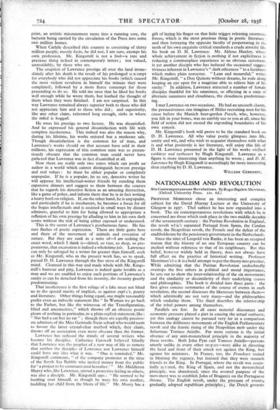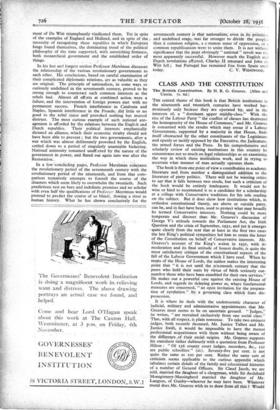NATIONALISM AND REVOLUTION
Six Contemporaneous Revolutions. By RogerBigelow Merriman. (Oxford University Press. rzs. 6d.) PROFESSOR MERRIMAN chose an interesting and complex subject for the David Murray -Lecture at the University of Glasgow in 1937. - That subject he has now expanded into a book. The six contemporaneous revolutions with which he is concerned are those which took place in the two middle decades . of the seventeenth century : the. Puritan Revolution in England, the revolt whiet separated Portugal from Spain, the Catalan revolt, the Neapolitan revolt, the Fronde and the defeat of the stadtholderate by the pensionary government in the Netherlands.
Since the time of Leopold von Ranke, it has been an accepted truism that the history of no one European country can be studied without reference to that of its neighbours. But this belief, however widely held in ,theory, does not always have full effect on the practice of historical writing. Professor Merriman's t o is a bold attempt to put the theory into practice.; While admitting that the Puritan Revolution undoubtedly overtops the five others in political and moral importance, he sets out to show the inter-relationship of the six movements and the similarity or dissimilarity of their underlying causes and philosophies. The book is divided into three parts : the first gives concise summaries of the course of events in each revolution, the second discusses the likenesses between them— which admittedly are not very many—and the philosophies which underlay them. Tht third describes the relationship of the rebel-powers among themselves.
Parallels are few. In all cases material discontent and economic pressure played a Part in causing the actual outburst, yet this analogy cannot be pursued very far in a comparison between the deliberate movements-of the English Parliamentary revolt and the frantic rising of the Neapolitan mob under the fisherman Tomaso Aniello. Far more curious is-the initial absence of any anti-monarchical principle in the majority of these revolts. Both John Pym and Tomaso Aniello—persons utterly unlike in every other retptct—were alike in directing the head and front of their attack not against the King, but against his ministers. In France, too, the Frondeurs united in blaming the regency, but insisted that they were staunch friends to the King. In Portugal, where the revolt was essen- tially rut tonal, the King of Spain, and not the monarchical principle, was abandoned, since the avowed purpose of the movement was to establish John of Bragatiza on the Portuguese throne. The English revolt, under the pressure of events, gradually adopted republican _principles ; the Dutch govern-
ment of De Witt triumphantly vindicated them. Yet in spite of the examples of England and Holland, and in site of the necessity of recognising these republics in which European kings found themselves, the dominating trend of the political philosophy of the time supported, with astonishing firmness, both monarchical government and the established order of things.
In his last and longest section Professor Merriman discusses the relationship of the various revolutionary governments to each other. His conclusions, based on careful examination of their complicated diplomatic relations, are as valuable as they are original. The principle of nationalism, in some ways so curiously undefined in the seventeenth century, proved to be strong enough to counteract such common interests as the rebels had. Almost all effarts at combined action were a failure, and the intervention of foreign powers met with no permanent success. French interference- in Catalonia and Naples, Spanish interference in the Fronde, ,did little or no good to the rebel cause and provoked nothing but mutual distrust. The most curious example of such national ant- agonism is afforded by the relations between the English and Dutch republics. Their political interests emphatically dictated an alliance, which their economic rivalry should not have been able to prevent ; but the two governments, after a war which was almost deliberately provoked by the English, settled down to a period of singularly unamiable bickering. National animosity remained unaffected by the nature of the government in power, and flared out again into war after the Restoration.
In a few"con-cluding pages, Professor Merriman compares the revolutionary period of the seventeenth century with the revolutionary period of the nineteenth, and from that com- parison tentatively attempts to foretell the course of the disasters which seem likely to overwhelm the twentieth. Such predictions rest on bare and indefinite premises and no scholar with even half the qualifications of Professor Merriman would pretend to predict the course of so blindl, flowing a river as human history. What he has shown conclusively for the seventeenth century is that nationalism; • even in its primiti% and undefined stage, -was far stronger to divide the people than a common religion, a c immon sense of oppression, or a common republicanism were to unite them. It is not without significance that the mqst obviously " national " revolt was the most apparently successful. However much the English and Dutch revolutions effected, Charles _II returned and John de Witt fell ; but Portugal has remained free from Spain until

























































 Previous page
Previous page